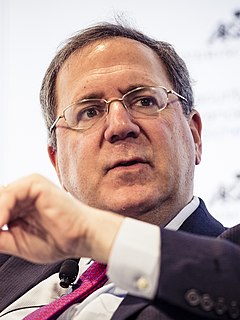A Quote by John O. Brennan
U.S. computer networks and databases are under daily cyber attack by nation states, international crime organizations, subnational groups, and individual hackers.
Related Quotes
We face cyber threats from state-sponsored hackers, hackers for hire, global cyber syndicates, and terrorists. They seek our state secrets, our trade secrets, our technology, and our ideas - things of incredible value to all of us. They seek to strike our critical infrastructure and to harm our economy.
I worry most about proliferation of weapons of mass destruction in such a way that they could be acquired by non-governmental organizations, like terrorist groups, especially the radical groups. When a nation state has a nuclear weapon, it's a little bit easier to control the use of it, but for non-governmental groups it's much more difficult.
If the various groups in America had been less selfish and had permitted different representatives from the groups to travel into foreign countries, and broaden their own scope, and come back and educate the movements they represented, not only would this have made the groups to which they belonged more enlightened and more worldly in the international sense, but it also would have given the independent African states abroad a better understanding of the groups in the United States, and what they stand for, what they represent.
































